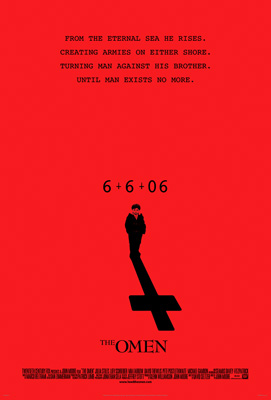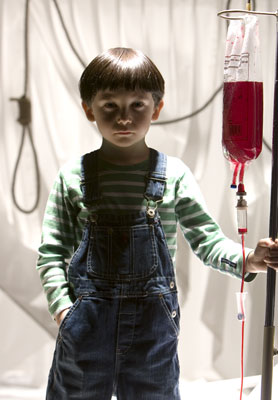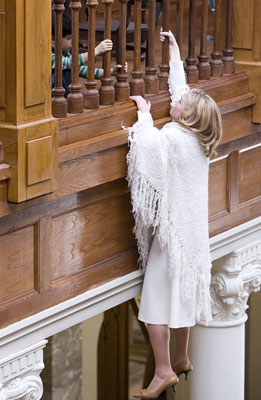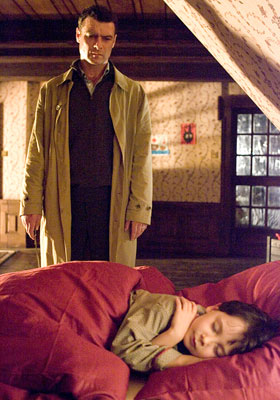 John Moore might be positioning himself as the king of remakes. He’s got three films under his belt, and two are remakes – the last one was Flight of the Phoenix, and the latest is a redo of The Omen. This version stars Liev Schreiber in the Gregory Peck role, Julia Stiles in the Lee Remick role and a fantastic Mia Farrow as Mrs. Baylock. Look for interviews with all three in the days leading up to The Omen‘s 6/6/06 release (yes, a Tuesday).
John Moore might be positioning himself as the king of remakes. He’s got three films under his belt, and two are remakes – the last one was Flight of the Phoenix, and the latest is a redo of The Omen. This version stars Liev Schreiber in the Gregory Peck role, Julia Stiles in the Lee Remick role and a fantastic Mia Farrow as Mrs. Baylock. Look for interviews with all three in the days leading up to The Omen‘s 6/6/06 release (yes, a Tuesday).
What’s remarkable about Moore’s version of The Omen is how similar it is to Richard Donner’s version. In fact the Writer’s Guild felt it was so similar it have original writer David Seltzer the final screenplay credit on the movie. Some things are obviously different this time, as the film takes place in the modern day, and one of the updatings touched a nerve at the New York City press screening last week. In a scene where the Pope is shown evidence that the AntiChrist is born, footage of the attack on the Twin Towers is used. After the screening there was a Q&A with Moore and theologian L Michael White (I’ll be interviewing him this week for his unique take on the film and the end times), and an audience member (whose identity I think I know, and it’s someone well known, but I can’t verify it enough to print it) yelled at Moore, an Irishman, for using the 9/11 footage. That outburst was the first thing I wanted to know about at the junket that took place the next day…
(Warning: If you have somehow made it this far without ever having seen the terrific original The Omen, this interview will be spoilery. If you have seen it, you know everything already.)
Q: You had a heckling issue at the screening last night.
Moore: We showed the movie last night to writers and commentators. During the introduction to the Q&A a gentlemen purported to have a question which really turned out to be a statement. He asked if I was from New York, and I said no. Then he said, ‘How dare you use an image of 9/11 and your movie’s a piece of shit’ and then he stormed off.
Q: What’s your reaction to that? It’s interesting that the 9/11 footage is used amidst a lot of other atrocity and war footage that he didn’t comment on.
Moore: I did stay up late at night wondering whether or not to use that in the movie. Other people said, ‘For God’s sake, use Rwanda,’ or something like that. Which in and of itself is interesting. But you’d have to be churlish to not understand that this is America. If you’re using images of pain that happened in America and you’re showing it to Americans you can expect there to be an emotional reaction. But what I simply did – believe me, I looked into a lot of cases of pure evil, and it’s undeniable that looking at the last few years you can’t walk away thinking that’s not one of the most significant events. That’s why it’s used. I tried to use it in an analytical context. I didn’t use it to get people upset.
Q: Do you believe in pure evil?
Moore: No, I don’t believe in pure evil. I believe in the complexity of evil. I believe it’s a conspiracy rather than an essence, if I’m understanding your question.
Q: What about Satanic evil, which is what this film is about?
Moore: Yes, it is about that. I believe in it in the more metaphorical scenario. I believe that evil needs devices rather than it doing its thing.
 Q: The original 1976 David Seltzer screenplay – quite a bit of this film seems to be his. Wasn’t there another guy named Dan something who did work on it?
Q: The original 1976 David Seltzer screenplay – quite a bit of this film seems to be his. Wasn’t there another guy named Dan something who did work on it?
Moore: Dan McDermott was a credited writer, but due to the machinations of the WGA he lost his credit. We did use Mr. Seltzer’s script extensively.
Q: But he didn’t actually work on the screenplay.
Moore: He didn’t work on the movie. I’ve never met the gentlemen, never even spoken with him. But when I was given the project I was sent The Omen By David Seltzer, copyright 1975. I didn’t feel a great need to rush out and fix what wasn’t broken. The story of the movie is extraordinarily good and extraordinarily tight – especially by today’s script standards, it’s a damn good script. So I didn’t feel the need to completely rework it.
Q: The Omen is so well known and such a part of the culture – you didn’t feel the urge to put your own touches on it?
Moore: I think I did by default. It’s a different cast, it’s a different movie, it’s a different experience. The story is the same. I don’t mean this in a flattering way to myself, I mean it in a flattering way to the text: It’s a bit like a Shakespeare play. You very much want people to enjoy the experience of the play, but the text is so good and the story tracks so well that you feel inclined to stick with that.
I asked Richard Donner to see the movie, which he did on Monday night. He’s happy with it.
Q: You’re so faithful to the original, but one place where you’re not faithful is that you don’t have that famous chanting music cue. Why did you leave that out?
Moore: Among the many differences is the music. There were voices saying go with the original soundtrack if you’re following the ‘If it’s not broke, don’t fix it’ line. But I wanted a soundtrack that was different. I think to use the original would have been pointless. But ironically enough, the fellow who did score it, Marco Beltrami, who I had worked with before, had studied under [Jerry] Goldsmith. They were friends, and he was a bit of a prodigy of Jerry’s. So it felt very natural, and if you listen carefully there’s a three note motif in there as a tribute to Mr. Goldsmith.
Q: Are you at all worried that a 2006 audience isn’t ready for the pacing of a 1976 story?
Moore: You know what? There wasn’t a day gone by where I didn’t remark to Glenn Williamson, the producer, that I felt anxious. I said, you know what, I don’t know if people are going to sit around and listen. You kind of have to pay attention to The Omen, otherwise it’s just some guy saying a poem, I don’t what the fuck… [laughs] Honest to God, I have had cold sweats thinking, Jesus, we should have done a fucking page one rewrite on this one. But we didn’t and I’m glad we didn’t. We would have been pandering.
Things change, everything changes. Life is change, and like it or not, everything changes. But occasionally you have to say, I don’t like that change and I don’t want it to be so. [This] is a fragile piece of work. If you don’t follow that poem – if the text of the poem and the delivery of the poem isn’t embraced, understood, then it’s a fragile thing. That’s also part of the reason I didn’t want to gore up the movie. The movie has shocking moments, but they’re not cheap and gory.
But occasionally you have to say, I don’t like that change and I don’t want it to be so. [This] is a fragile piece of work. If you don’t follow that poem – if the text of the poem and the delivery of the poem isn’t embraced, understood, then it’s a fragile thing. That’s also part of the reason I didn’t want to gore up the movie. The movie has shocking moments, but they’re not cheap and gory.
Q: At the end of the day, how damned – no pun intended – are you if you do, or if you don’t when remaking something. Some people will say, ‘This is a shot for shot remake’ and some people will say, ‘He tampered with the original.’ How do you win in a scenario like this? Unless the movie makes a hundred million dollars, people will find something to criticize.
Moore: Even then you don’t win because you have to go to bed at night and suffer that criticism, which is part of the contract of doing a remake. When you sign up you are signing up to be criticized for doing a remake. It is inevitable. I don’t know the answer, and I don’t say this in defense of doing remakes, but it’s curious to me – and I think this has something to do with snobbery – but it’s curious to me and there’s an ironic example not twenty yards from here: Liev can do a do a movie like The Omen and beat up for doing a remake, as I do on occasion. And then he can do Shakespeare in the Park and… It seems like maybe the art form isn’t old enough, and people are – rightly so in many cases – cynical about the recycling of material that quickly.
Q: Even you would probably hesitate to do a remake of Casablanca or Citizen Kane.
Moore: Yes, and why is the unasked question. People accuse me of remaking a classic – I’ve done remakes of two classic films, but I feel that if you’re going to remake anything, remake a classic film.
[One of the journalists looks through the press notes to see what the other classic is. Another journalist tells him it’s Flight of the Phoenix)
Don’t worry, nobody saw it! That’s how I got off the hook on that one!
But to answer your question, why to not redo Casablanca or Citizen Kane? Somebody will.
Q: This film is obviously going to be counting on the younger audience at the box office. A lot of younger moviegoers may not even be aware of much about The Omen beyond the concept. We just had Final Destination 3, which borrowed heavily from The Omen, including the idea of deaths showing up in photographs. What impact do you think The Omen will have in this day and age? Do you think some younger audiences will think this is a Final Destination rip-off?
Moore: I’m sure there will be ironic, frustrating moments like that. At the end of the day,  what I hope is that The Omen – and I say this with every sense of the irony of what I’m about to say, as I know it’s a remake – but if it’s embraced by the younger audience it could be a good sign of things to come, because The Omen is first and foremost a damn good story. It’s not full of CG, it’s not intended to be part of a trilogy. If the younger audience could groove on this movie, I would say that’s a good sign.
what I hope is that The Omen – and I say this with every sense of the irony of what I’m about to say, as I know it’s a remake – but if it’s embraced by the younger audience it could be a good sign of things to come, because The Omen is first and foremost a damn good story. It’s not full of CG, it’s not intended to be part of a trilogy. If the younger audience could groove on this movie, I would say that’s a good sign.
Q: Would you do a sequel to this one?
Moore: I wouldn’t, personally. I don’t think it was ever intended to be sequelized. But goddammit, there’s just something about the bad guy winning!
Q: The ending to this one seems to one-up the original.
Moore: I wouldn’t be interested in doing a sequel, but I could see the interest in doing one. There’s an itch you have to scratch, and that itch is put on you by the end of the movie.
Q: There are things in the original, which I just watched two weeks ago, that I still have issues with. Where did you decide what to fill in – such as more of Robert and Catherine as a couple – and what plot holes to leave alone, such as why didn’t Jennings take pictures of Catherine and Robert?
Moore: Why doesn’t Robert go, ‘Hey, got any shots of me?’ You’re right, there are some holes. Sometimes you skip a stone across a pond and if it goes quickly enough and has enough momentum… you employ that techniques sometimes. It is the job of the movie, if made well, to not put a spotlight on those things. Here’s Thorn being shown evidence of the method of death and later, after the movie, you go ‘Why didn’t he ask did he take any pictures of me?’ But if it’s well made it’s so compelling that you want to keep moving forward.
Q: Where did the trap door scene come from, where the dog falls into?
Moore: I wanted to reinvent the piece.
Q: It seems almost comical.
Moore: It’s on the edge, I’ll give you that. There were days when I was in the cutting room and I was like, ‘Oh, I don’t know.’ But I had to get rid of the dog! We ran out of money, because in my original draft of the ending the dog gets free, and there’s this huge sequence where he gets his head into the hole in the windscreen that Baylock knocks, and the dog is attacking him. It looked great in the storyboards. But we ran out of money.
Q: Speaking of endings, I know that Donner’s original ending had Peck killing the child, but they decided they couldn’t go that way. Was there ever any thought to changing that ending?
Moore: Never. Never, never, never. That child had to live or The Omen ceases to be valid.
Q: Thirty years ago there were elements of the Roman Catholic Church who were vocal in their displeasure with the film. This one is slipping in under the radar –
Moore: They have something else to worry about!
I think they’ll get down on their knees and thank me. This movie says, ‘Everything you guys peddle on Sundays is true.’ We get no attention and this one is based on fact, or based on fact of text of the Bible. Yet Da Vinci is proclaimed as fiction and gets everyone in a tizzy. Interesting times we live in where that can happen.
Q: What will we see on the DVD?
Moore: You’re going to see two comprehensive documentaries about the making of this new version. And one about the music and sound employed. DVD is such a fantastic format for anyone who has invested a couple of dollars in their home systems.
version. And one about the music and sound employed. DVD is such a fantastic format for anyone who has invested a couple of dollars in their home systems.
Q: Any deleted scenes?
Moore: Maybe. If I get the money to go and shoot the dog ending!
Q: It seems like this film might not exist if it wasn’t for the date. Is there an extra pressure on you when you know you have to get this film done and out by June 6, 06, otherwise all of Fox’s plans are out the window?
Moore: There’s a pressure, but it’s a joy as well. Any director will tell you that hell is not having a release date.
Q: What’s next?
Moore: A couple of things. I’m thinking about getting back to Bosnia, which is a subject I touched on and got beaten up for in my first movie. I’m trying to do another movie about that war.